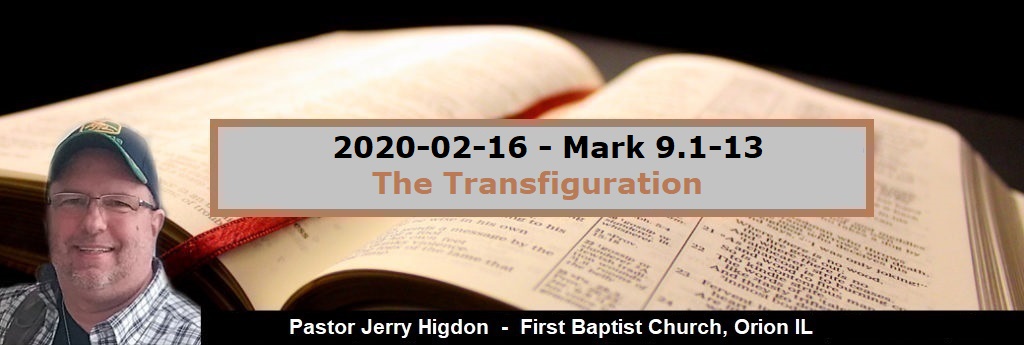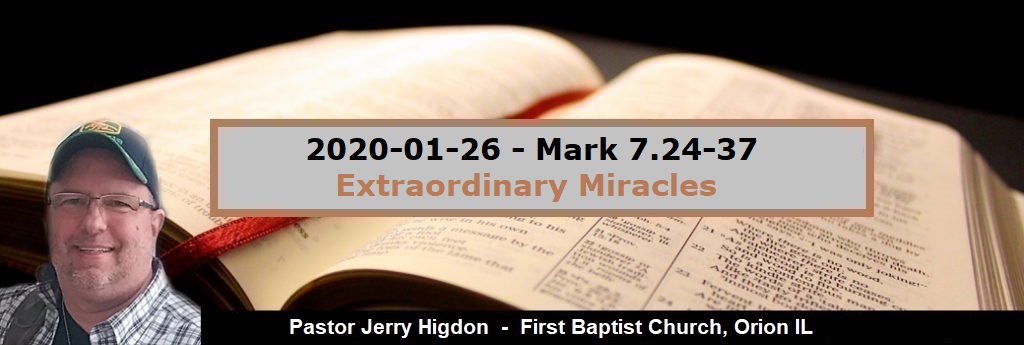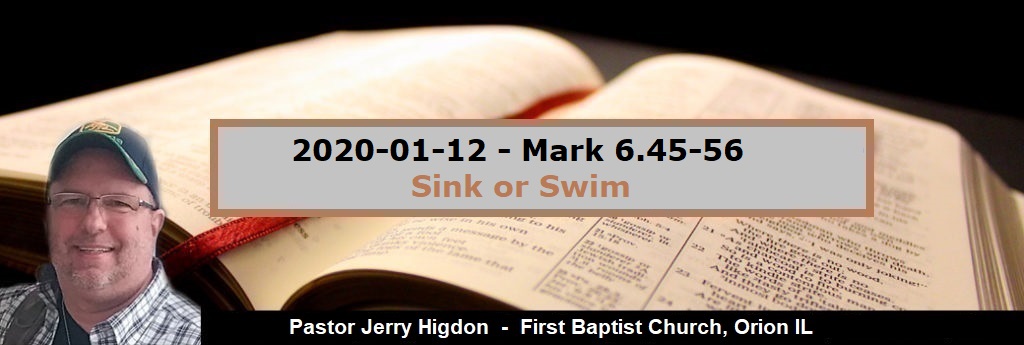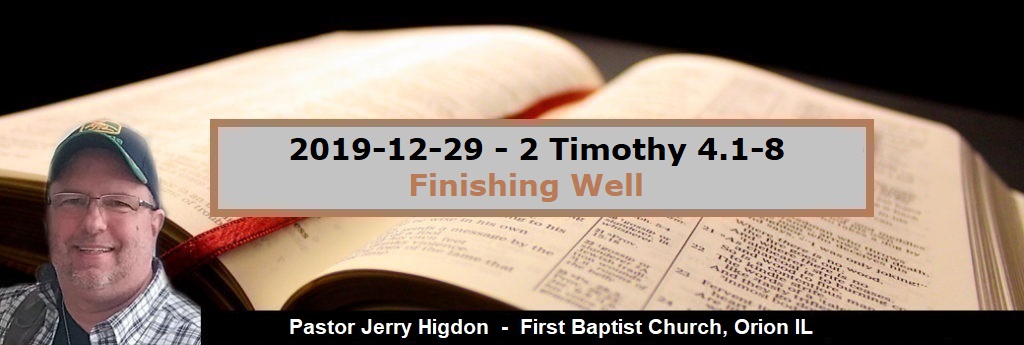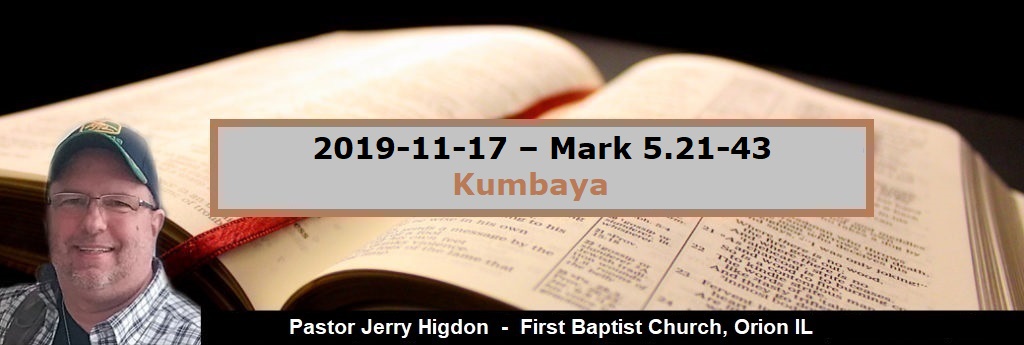2020-02-09 – Mark 8.22-9.1 – Physical and Spiritual Blindness
Update: 2020-02-09
Description
2020-02-09 - Mark 8.22-9:1 - Physical and Spiritual Blindness
Good morning everyone. It is so nice to be able to spend some time with you all in fellowship with the Lord. Thank you and God bless you for being with us today.
Have you ever heard the term “the blind leading the blind”? Generally this term is used when somebody provides advice to people that have no idea that the one that is giving advice really has no idea of what they are talking about either.
Kind of reminds me of when I was a young sergeant leading some soldiers in the forest. They were all looking to me for direction, so I gave them.. a direction. Unfortunately I really had no idea which way we should have gone and it became quite apparent after a couple hours of walking and finally ending up where we started. I was the blind sergeant leading the blind soldiers. I never really lived that one down J Today in scripture we are going to witness two different kinds of blindness. The physically blind and the spiritually blind.
Please turn in your Bibles to Mark 8.22, pew Bibles pg. 895 in God’s Inspired, Infallible and Living Word, but let us first start with Prayer.
At this point in scripture Jesus was starting to prepare himself and the disciples for His eventual crucifixion and death. He had been ministering for a little more than two years now, and He had performed many miracles and had a huge following of people. People were starting to call Jesus their Savior-Messiah, but at the same time He had gained the attention of Jewish leaders, and they were now sending Pharisees and Scribes as spies to try to trip Him up and look for reasons to have Jesus killed. Last week we read how Jesus fed 4,000 Gentiles in the wilderness, then He explained to his Disciples that just like when He previously fed the 5,000 Jews, they always ended up with more food then from which they started. Jesus also wanted them to clearly understand that their ministry would be for all people including Gentiles, and that they can have confidence that God will provide. They, and we, have nothing to worry about. Like the Disciples, we can trust the Lord in all things, for He is good, and loves us so much.
That takes us to today’s verses, starting at verse 22, Mark wrote:
22 They came to Bethsaida. They brought a blind man to him and begged him[Jesus] to touch him. 23 He took the blind man by the hand and brought him out of the village. Spitting on his eyes and laying his hands on him, he asked him, “Do you see anything?” 24 He looked up and said, “I see people—they look like trees walking.” 25 Again Jesus placed his hands on the man’s eyes. The man looked intently and his sight was restored and he saw everything clearly. 26 Then he sent him home, saying, “Don’t even go into the village.”
Similarly, if you recall our message from two weeks ago, Jesus healed a deaf & mute man by putting his fingers in the deaf mans ears. These hands-on healings were probably mind blowing to the Jewish believers there, as it wasn’t acceptable that Jews even conversed with the unclean Gentiles let alone touching their ears or their eyes. For a Jew, that would immediately make you unclean for doing such a radical thing. Jesus did all kinds of things that was considered radical in His ministry. He was knocking down all kinds of self imposed standards and norms.
At this point in His ministry, Jesus had healed many, many people, including some that were blind. But never before was it recorded though that Jesus spit on a persons to heal them. You could just imagine the disciples were aghast again as a result. So much so, that Mark, who probably was told about this incident by Peter, decided to record it in this Gospel that we are now reading. Mark wanted people to read and understand that Jesus was truly a different type of Messiah-Savior than what anyone had imagined. Jesus had already gained a reputation as being an amazing healer, but could you imagine going to the eye-doctor’s office and as part of his prescription he would spit in your eye. I think Jesus was showing the Disciples the importance of getting intimate and personal with the people. He didn’t want them to be hands-off kind of ministers. Sometimes it is required that we touch others, with wisdom and scrutiny of course. But the appropriate touch of another soul is very important in ministry. Holding a hand of a dying friend, giving an appropriate hug, washing feet or even a fist-bump are important methods to better convey healing love and compassion. Jesus even touched the lepers that nobody else would dare to even come close to.
After reading this account though, one might ask why didn’t Jesus’s miracle, work fully the first time He did it? And to be honest I am not really sure. This is the one and only two-stage miracle recorded in scripture. Coincidently it is the only miracle recorded that Jesus asked a follow-up question to the one being healed.
I would argue that there was a meaning, otherwise why would Jesus even ask. I don’t think it was a coincidence, and maybe it was just to show the Disciples and us that we shouldn’t give up when the results don’t turn out as miraculous as we might like the first time. Verse 27 continues:
27 Jesus went out with his disciples to the villages of Caesarea Philippi. And on the road he asked his disciples, “Who do people say that I am?” 28 They answered him, “John the Baptist; others, Elijah; still others, one of the prophets.”
29 “But you,” he asked them, “who do you say that I am?” Peter answered him, “You are the Messiah.” 30 And he strictly warned them to tell no one about him.
So Jesus asks this question, which I believed is stated in a very intentional way. He said first “Who do people say that “I AM”?” and then He asks “Who do you say that “I AM”?” Notice Jesus didn’t ask “who do they and you think “I Am”, which is what most people would probably say. But when you say something, you are acknowledging out loud to others. Recall that Jesus said earlier, that anyone who denies Him before man He will deny to Father God. Also notice here that Jesus uses intentionally the wonderful term “I Am” in these questions. Jesus is the Great I Am. He says it Himself many times in the New Testament. Just like Father God had originally said to Moses to go tell the Israelites that He was going to take them out of slavery in Egypt and lead them to the Promised Land. And He told Moses, when they ask you “who sent you” tell them the Great “I Am” sent you. So when Jesus uses this same “I Am” term so many times in His ministry, the Jews knew that Jesus was again proclaiming that He and God were one and the same “I Am”.
Jesus said, “But who do you say that I am?” Which is the most important question that any of us will ever answer. Who is Jesus Christ? Everybody on this planet is accountable to God eternally for the answer to that question. Wrong answer means hell. Right answer means heaven. Pastor John McArthur wrote, “Common people have answers to that; philosophers have answers; pseudo scholars have answers; liberal theologians have answers; Muslims have answers to that; Jews have answers to that; secularists, atheists, humanists, religionists. Answers, however, that condemn them”. Wrong answers that are not of the Bible.
It’s truly not hard for us to find and know Jesus if we just read Matthew, Mark, Luke, or John. I haven’t found it difficult at all. I love reading all about the life of Jesus. In fact John says the gospels were written in the first place to prove who Jesus is. John 20:31 says, “These things are written that you may believe that Jesus is the Christ, the Son of the living God.” Again, Jesus said, “But who do you say that I am?” Are you prepared to answer that question?
Peter’s answer, “You are the Christ, the Son of the living God.” Peter confesses exactly what the gospels are demonstrating. He doesn’t just have the gospels; he’s there in person with Jesus; Peter is living and ministering right there with Him. So, he comes to the conclusion that any good, faithful Gospel reader has to come to at some point. And when Peter answers, “You are the Christ.” That is only the second time the word “Christ” has been used in this Gospel of Mark. The first time is in Mark 1:1. So we haven’t heard that word in eight chapters. Christos is the Hebrew equivalent for anointed. Christos is not a name; Jesus is His name. Remember the angel said to Mary, “You shall call His name Jesus.” And His second name “Christ” for anointed defines His work and purpose. He is God’s promised King, Jesus the Christ, Jesus the anointed Prophet and Priest, amen?
31 Then he [Jesus] began to teach them that it was necessary for the Son of Man to suffer many things and be rejected by the elders, chief priests, and scribes, be killed, and rise after three days. 32 He spoke openly about this.
Peter took him aside and began to rebuke him. 33 But turning around and looking at his disciples, he rebuked Peter and said, “Get behind me, Satan! You are not thinking about God’s concerns but human concerns.”
They had followed Him for over two years. These men including the 12 apostles and others called disciples. And all along, they had hoped in their hearts that He would prove Himself to be the Messiah they had been waiting for. Here they finally affirm they know it. However, fast on the heels of that most glorious of all revelations, comes the incomprehensible bad news that their Messiah is going to be killed. Shocking news. So shocking that Peter goes from being a hero in one minute to being an anti-hero in the next. So shocking that he goes from being a spokesman for God to being a spokesman for Satan. Peter has two colliding revelations. He realizes that Jesus is the Messiah, the One whose life will bring salvation and blessing to Israel and the world. Yet He will be killed shortly by the people of Israel and the world.
Peter didn’t want any part of that. Can you believe that He actually took Jesus aside and rebuked Him, lik
Good morning everyone. It is so nice to be able to spend some time with you all in fellowship with the Lord. Thank you and God bless you for being with us today.
Have you ever heard the term “the blind leading the blind”? Generally this term is used when somebody provides advice to people that have no idea that the one that is giving advice really has no idea of what they are talking about either.
Kind of reminds me of when I was a young sergeant leading some soldiers in the forest. They were all looking to me for direction, so I gave them.. a direction. Unfortunately I really had no idea which way we should have gone and it became quite apparent after a couple hours of walking and finally ending up where we started. I was the blind sergeant leading the blind soldiers. I never really lived that one down J Today in scripture we are going to witness two different kinds of blindness. The physically blind and the spiritually blind.
Please turn in your Bibles to Mark 8.22, pew Bibles pg. 895 in God’s Inspired, Infallible and Living Word, but let us first start with Prayer.
At this point in scripture Jesus was starting to prepare himself and the disciples for His eventual crucifixion and death. He had been ministering for a little more than two years now, and He had performed many miracles and had a huge following of people. People were starting to call Jesus their Savior-Messiah, but at the same time He had gained the attention of Jewish leaders, and they were now sending Pharisees and Scribes as spies to try to trip Him up and look for reasons to have Jesus killed. Last week we read how Jesus fed 4,000 Gentiles in the wilderness, then He explained to his Disciples that just like when He previously fed the 5,000 Jews, they always ended up with more food then from which they started. Jesus also wanted them to clearly understand that their ministry would be for all people including Gentiles, and that they can have confidence that God will provide. They, and we, have nothing to worry about. Like the Disciples, we can trust the Lord in all things, for He is good, and loves us so much.
That takes us to today’s verses, starting at verse 22, Mark wrote:
22 They came to Bethsaida. They brought a blind man to him and begged him[Jesus] to touch him. 23 He took the blind man by the hand and brought him out of the village. Spitting on his eyes and laying his hands on him, he asked him, “Do you see anything?” 24 He looked up and said, “I see people—they look like trees walking.” 25 Again Jesus placed his hands on the man’s eyes. The man looked intently and his sight was restored and he saw everything clearly. 26 Then he sent him home, saying, “Don’t even go into the village.”
Similarly, if you recall our message from two weeks ago, Jesus healed a deaf & mute man by putting his fingers in the deaf mans ears. These hands-on healings were probably mind blowing to the Jewish believers there, as it wasn’t acceptable that Jews even conversed with the unclean Gentiles let alone touching their ears or their eyes. For a Jew, that would immediately make you unclean for doing such a radical thing. Jesus did all kinds of things that was considered radical in His ministry. He was knocking down all kinds of self imposed standards and norms.
At this point in His ministry, Jesus had healed many, many people, including some that were blind. But never before was it recorded though that Jesus spit on a persons to heal them. You could just imagine the disciples were aghast again as a result. So much so, that Mark, who probably was told about this incident by Peter, decided to record it in this Gospel that we are now reading. Mark wanted people to read and understand that Jesus was truly a different type of Messiah-Savior than what anyone had imagined. Jesus had already gained a reputation as being an amazing healer, but could you imagine going to the eye-doctor’s office and as part of his prescription he would spit in your eye. I think Jesus was showing the Disciples the importance of getting intimate and personal with the people. He didn’t want them to be hands-off kind of ministers. Sometimes it is required that we touch others, with wisdom and scrutiny of course. But the appropriate touch of another soul is very important in ministry. Holding a hand of a dying friend, giving an appropriate hug, washing feet or even a fist-bump are important methods to better convey healing love and compassion. Jesus even touched the lepers that nobody else would dare to even come close to.
After reading this account though, one might ask why didn’t Jesus’s miracle, work fully the first time He did it? And to be honest I am not really sure. This is the one and only two-stage miracle recorded in scripture. Coincidently it is the only miracle recorded that Jesus asked a follow-up question to the one being healed.
I would argue that there was a meaning, otherwise why would Jesus even ask. I don’t think it was a coincidence, and maybe it was just to show the Disciples and us that we shouldn’t give up when the results don’t turn out as miraculous as we might like the first time. Verse 27 continues:
27 Jesus went out with his disciples to the villages of Caesarea Philippi. And on the road he asked his disciples, “Who do people say that I am?” 28 They answered him, “John the Baptist; others, Elijah; still others, one of the prophets.”
29 “But you,” he asked them, “who do you say that I am?” Peter answered him, “You are the Messiah.” 30 And he strictly warned them to tell no one about him.
So Jesus asks this question, which I believed is stated in a very intentional way. He said first “Who do people say that “I AM”?” and then He asks “Who do you say that “I AM”?” Notice Jesus didn’t ask “who do they and you think “I Am”, which is what most people would probably say. But when you say something, you are acknowledging out loud to others. Recall that Jesus said earlier, that anyone who denies Him before man He will deny to Father God. Also notice here that Jesus uses intentionally the wonderful term “I Am” in these questions. Jesus is the Great I Am. He says it Himself many times in the New Testament. Just like Father God had originally said to Moses to go tell the Israelites that He was going to take them out of slavery in Egypt and lead them to the Promised Land. And He told Moses, when they ask you “who sent you” tell them the Great “I Am” sent you. So when Jesus uses this same “I Am” term so many times in His ministry, the Jews knew that Jesus was again proclaiming that He and God were one and the same “I Am”.
Jesus said, “But who do you say that I am?” Which is the most important question that any of us will ever answer. Who is Jesus Christ? Everybody on this planet is accountable to God eternally for the answer to that question. Wrong answer means hell. Right answer means heaven. Pastor John McArthur wrote, “Common people have answers to that; philosophers have answers; pseudo scholars have answers; liberal theologians have answers; Muslims have answers to that; Jews have answers to that; secularists, atheists, humanists, religionists. Answers, however, that condemn them”. Wrong answers that are not of the Bible.
It’s truly not hard for us to find and know Jesus if we just read Matthew, Mark, Luke, or John. I haven’t found it difficult at all. I love reading all about the life of Jesus. In fact John says the gospels were written in the first place to prove who Jesus is. John 20:31 says, “These things are written that you may believe that Jesus is the Christ, the Son of the living God.” Again, Jesus said, “But who do you say that I am?” Are you prepared to answer that question?
Peter’s answer, “You are the Christ, the Son of the living God.” Peter confesses exactly what the gospels are demonstrating. He doesn’t just have the gospels; he’s there in person with Jesus; Peter is living and ministering right there with Him. So, he comes to the conclusion that any good, faithful Gospel reader has to come to at some point. And when Peter answers, “You are the Christ.” That is only the second time the word “Christ” has been used in this Gospel of Mark. The first time is in Mark 1:1. So we haven’t heard that word in eight chapters. Christos is the Hebrew equivalent for anointed. Christos is not a name; Jesus is His name. Remember the angel said to Mary, “You shall call His name Jesus.” And His second name “Christ” for anointed defines His work and purpose. He is God’s promised King, Jesus the Christ, Jesus the anointed Prophet and Priest, amen?
31 Then he [Jesus] began to teach them that it was necessary for the Son of Man to suffer many things and be rejected by the elders, chief priests, and scribes, be killed, and rise after three days. 32 He spoke openly about this.
Peter took him aside and began to rebuke him. 33 But turning around and looking at his disciples, he rebuked Peter and said, “Get behind me, Satan! You are not thinking about God’s concerns but human concerns.”
They had followed Him for over two years. These men including the 12 apostles and others called disciples. And all along, they had hoped in their hearts that He would prove Himself to be the Messiah they had been waiting for. Here they finally affirm they know it. However, fast on the heels of that most glorious of all revelations, comes the incomprehensible bad news that their Messiah is going to be killed. Shocking news. So shocking that Peter goes from being a hero in one minute to being an anti-hero in the next. So shocking that he goes from being a spokesman for God to being a spokesman for Satan. Peter has two colliding revelations. He realizes that Jesus is the Messiah, the One whose life will bring salvation and blessing to Israel and the world. Yet He will be killed shortly by the people of Israel and the world.
Peter didn’t want any part of that. Can you believe that He actually took Jesus aside and rebuked Him, lik
Comments
In Channel







